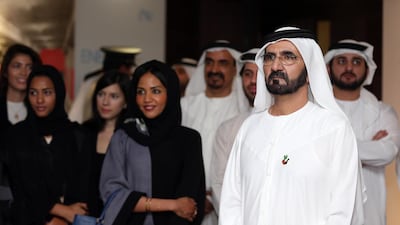Sheikh Mohammed bin Rashid said the country is "counting on education" to help propel the UAE to success on the world stage - after reviewing the progress of a multi-billion dirham overhaul of the school system.
Government leaders assessed the progress of the Emirati School Model, which was launched in 2017 in an effort to standardise the national curriculum and equip learners with the skills needed to thrive in the job market, during a UAE Cabinet meeting on Sunday.
The UAE Government has allocated Dh5 billion to be invested in the ambitious project - which has been implemented in 800 public and private schools across the country - over a six-year period.
The Vice President and Ruler of Dubai said the UAE is committed to becoming a world-leader in education, with the Emirati School Model key to the bold vision.
The Emirati School Model has a focus on mathematics and science and aims to sharpen vital life skills, as well as bolstering business acumen and entrepreneurship.
The education scheme also aims to broaden the horizons of students by expanding their language skills, with more than 9,000 learners currently taking Chinese and French lessons in the country's schools.
The programme has been set up to create the leaders of the future and help the country meet long-term strategies for the future prosperity of the country by investing in the talent of its youth.
"We are counting on education in the race of nations," said Sheikh Mohammed.
"Investment in human development is the only investment that does not know loss. Our goal is to be the best in education globally.
"The UAE school is a centre for the future. And our students are the leaders of the future of the UAE.
"We want an educational system that does not depend on information-teaching, but trains the mind on creativity and innovation in thinking.
"You are the source of our pride and our most precious wealth. We want the highest building in the UAE to be the building of Emirati minds embracing space," he said.
The cabinet meeting, also attended by Sheikh Saif bin Zayed, Deputy Prime Minister and Minister of Interior, and Sheikh Mansour bin Zayed, Deputy Prime Minister and Minister of Presidential Affairs, discussed a range of national issues.
The cabinet adopted the Federal Law on Senior Emiratis, a nationwide policy to protect rights and ensure quality healthcare provision, rehabilitation and access to essential services.
UAE enterprise was also high on the agenda, with the cabinet agreeing an amendment to an existing commercial agencies law, which will allow local agencies to become public shareholding companies in order to ensure their competitiveness and sustainability and enhance their economic performance.
The cabinet also approved linking payment systems among Gulf Cooperation Council countries (GCC) with financial institutions and central banks.
Decision-makers also gave the green-light to the formation of the Foreign Direct Investment Committee, which will work towards attracting further foreign investment into the UAE.
The authority, which will be chaired by the UAE Minister of Economy, will assess bids to invest in the UAE by overseas bodies.
The wide-ranging meeting also discussed plans to tackle the threat of dangerous animals being brought into the country.
A federal law on the regulation and possession of dangerous animals was adopted - as part of a bid to safeguard the public from potential harm at the hands of animals and from diseases that can be transmitted to other animals.
The law also ensures that dangerous animals receive appropriate care at specialised centres.

